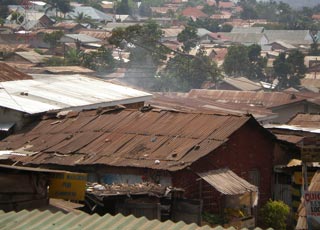
By Patrick Kagenda
Central Bank Governor Tumusime Mutebile called it “the most innovative thinking in development literature in 30 years” but the 2009 World Development Report has sparked strong opposition among Uganda’s economic experts.
They disagree on answers to two fundamental questions posed by the report: Whether the growing concentrations of people in cities will cause prosperity or produce more slums and squalor and how the government should deal with the economic disparity between the rich in urban centres and the poor in the rural areas.
The report titled: “Reshaping Economic Geography” was released in November 2008 in Washington DC but was launched last week in Kampala.
It notes that no country has grown to middle income without industrialising and urbanising.
“The rush to cities in developing countries seems chaotic but it is necessary,” the report says.
Reacting to the report’s recommendations, Mutebile said told the audience at the launch: “We are moving somewhere with this framework”.

But Finance Minister Saida Bbumba disapproved of the report’s “rural-urban migration plan”.
“Uganda has advanced plans to enhance rural development through increasing the agricultural budget to Shs 36 billion to support smallholder farmers,” she said.
But the report notes that such efforts to prematurely spread economic growth through “geographical targeting” or different policies for rural areas and urban areas “jeopardize progress”. It recommends a more balanced approached that recognizes disparities in density, distance, and division.
The report calls for regional integration as a way forward and encourages rural “”urban migration using examples of China where people have migrated for up to 1,000 miles in search of employment and the US where people have moved to the east and some parts of the west of the country for employment leaving the central region with scanty population.
It highlights how colonial political geographical divisions have hindered development by creating both official and non-tariff barriers in Africa. It looks at local, regional and international geographic scales as contributing factors to development.
But a prominent economist at the National Planning Authority speaking on condition of anonymity told The independent: “We have our own plans that are more suitable for Uganda than what the World Bank is advancing. We have interacted with the World Bank and their ideas are good but Ugandan challenges are different from what the World Bank is advancing. They bring Asian success stories but they forget we have different geographical setups and our economies are totally deferent. They are bringing to us things in economies that are 40 years older than ours. They have been coming to us that we adopt their report but we have refused it.”

Tasasira Longino Executive Director at National Planning Authority differed with his economist.
“We have to look at the report closely and establish what type of industries it is talking about,” he told The independent, “We can pick some points from the report say on economic density by either reviving Jinja industrial area and return it to the 1960`s state as an industrial base with a big working population because that is what the report is talking of or we go ahead concentrating on the industrial parks government is planning”.
The report says when all infrastructure is concentrated in production areas people will move in to seek employment and the rural areas will take to commercial farming.In Uganda there is limited commercial farming.
The Ugandan experts appear apprehensive because of the pace at which cities like the capital Kampala are fast turning into a slum city as a result of a huge population influx from the rural to the urban in search for jobs and social services that the government has failed to avail in the rural areas.
The biggest challenge for Uganda, the report notes, is the critical need for proper planning in the cities and urban centers and prioritisation of allocating services is a problem.
The World development report acknowledges the need for uplifting the remote areas through creating opportunities for economic agglomeration by improving infrastructure.
The report shows the imbalance caused by agglomeration or concentration of people and its effects on the movement of labour. The southern half of Uganda is more agglomerated than the northern part of the country.
The report has a bigger message for Uganda which has one of the highest birth rates in the world standing at 3%.
Despite the disagreement, Uganda’s investment in infrastructure as a means of enhancing economic development with the injection of Shs 1.1 trillion appears to be in the right direction.The government, in the 2008-09 financial year prioritised infrastructure development along major production and supply transport corridors.
The report highlights some critical aspects in Uganda’s development. It report calls for regional integration to increase on economies of scale. Uganda is the leading advocate for East African integration although its business community is complaining of not being considered and could lose out in the bigger regional market.
Saida Bbumba says, “Integration is a slow difficult process that needs to be driven by economic interests and a need to built interdependent linkages to benefit from specialisation and larger economies of scale. With the majority of African populations leaving in rural areas and dependent on agriculture, increasing agricultural activity and agro-based economic opportunities is very important and would promote rural development thus curbing the rural-urban migration”.
Uganda’s Prime Minister Professor Apollo Nsibambi while opening the one day launch of the WDR2009 said Uganda’s vision to transform the economy will depend on value addition.
He said government was already in strong partnership with the private sector.
 The Independent Uganda: You get the Truth we Pay the Price
The Independent Uganda: You get the Truth we Pay the Price


